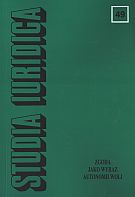THE NOTION OF AGREEMENT AS A PART OF POSSIBLE INTENTION
POJĘCIE „ZGODA” W KONSTRUKCJI ZAMIARU EWENTUALNEGO
Author(s): Tomasz PrzesławskiSubject(s): Law, Constitution, Jurisprudence
Published by: Wydawnictwa Uniwersytetu Warszawskiego
Keywords: prawo karne; godzenie się; zgoda; agreeing; agree; penal law; Polish law;
Summary/Abstract: The article is dedicated to agreement, i.e. the notion of “agreeing” used by the criminal code to define the so-called possible intention. Historically, this intention appeared in relation to criminal effect, which resulted from an act made with permitted intent. Later on the act itself also included bad intention, while further realised possible consequences encompassed the possible intention. The possible intention replaced the so-called oblique or indirect intention, which was based on the mediaeval (12 th century) rule of versanti in re illicita imputantur omnia, quae sequuntur ex delicto. According to this rule, a person who was on the slippery slope towards a life of crime with bad intention was tried on the basis of intentional guilt for all consequences brought on by oneself, if they could have been foreseen by him or her in general opinion. The author predicts that the evolution of the subjectivity rule did not end along with the contemporarily defined intention, but it will evolve further along with the technological progress, significantly specifying and narrowing the limits of establishing mental experiences, especially the agreement occurring with the possible intention. According to the author, the concept of agreement consists in a comprehensive consideration of consciousness and motivation in the decision-making process (traditionally referred to as will), for which he suggests the term: decision-making (volitional) and motivational. On the one hand, the agreement is related to the imagined future consequence, while on the other hand, it is related to conflicting motivation, one of which presses will in the direction of achieving a basic goal, while the other – in the direction of stopping the decision-making process aimed at the goal, on account of the judgement of the nature of realised possible consequence and the kind of feelings accompanying this notion. Overcoming the intellectual and motivational obstacle, that is the easiness of expressing the inner agreement, depends on the assessed degree of reprehensibility or acceptability of realised possible consequence or the feelings of distress or pleasure, connected with the view of future unintended consequence. Thus, agreement may resemble “wanting”, which occurs in direct intent and is backed up by desire, it may also come closer to the indifference of will or it may be near to abandon an act.
Journal: Studia Iuridica
- Issue Year: 2008
- Issue No: 49
- Page Range: 169-181
- Page Count: 13
- Language: Polish

